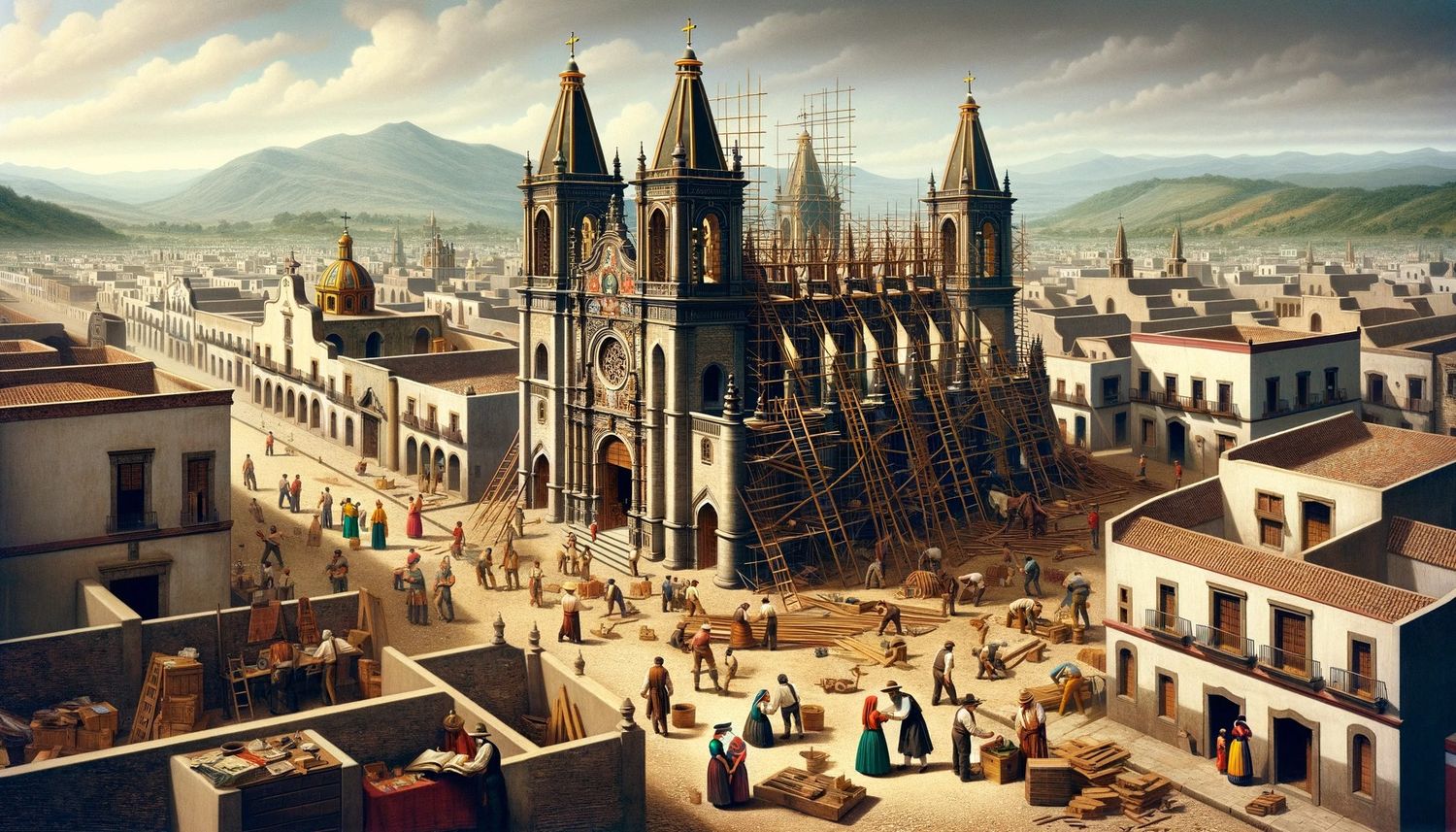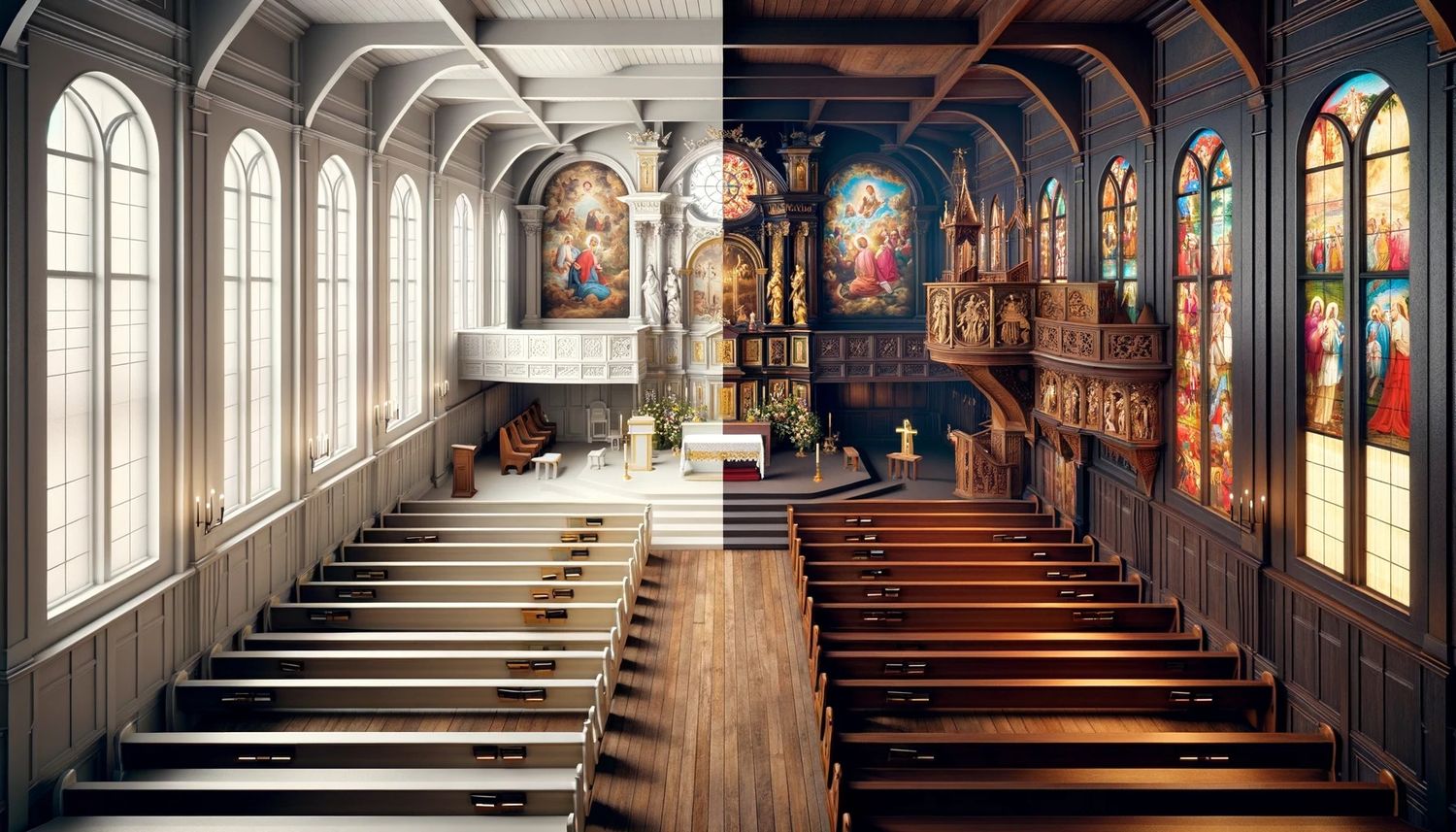Home>Theology and Spirituality>How To Learn Catholicism


Theology and Spirituality
How To Learn Catholicism
Published: February 18, 2024
Jason DeRose, Managing Editor at Christian.net, uses his expertise in religion and journalism to deepen understanding of faith's societal impacts. His editorial leadership, coupled with a strong academic background, enriches the platform’s diverse content, earning him recognition in both journalism and religious circles.
Discover the fundamentals of Catholicism and deepen your understanding of theology and spirituality with our comprehensive guide. Explore the rich traditions and teachings of the Catholic faith.
(Many of the links in this article redirect to a specific reviewed product. Your purchase of these products through affiliate links helps to generate commission for Christian.net, at no extra cost. Learn more)
Table of Contents
Introduction
Embarking on a journey to learn about Catholicism is a profound and enriching experience that delves into the depths of spirituality, tradition, and faith. Whether you are new to Catholicism or seeking to deepen your understanding of this ancient and revered faith, the path to learning Catholicism is one filled with discovery, contemplation, and a sense of connection to something greater than oneself.
As you begin this journey, it's essential to approach it with an open heart and a willingness to explore the rich tapestry of beliefs, practices, and rituals that define Catholicism. This exploration is not merely an intellectual pursuit but a spiritual odyssey that invites you to engage with the profound wisdom and traditions that have shaped the lives of countless individuals throughout history.
Learning about Catholicism offers an opportunity to gain insight into the foundational principles that underpin the faith, including the teachings of Jesus Christ, the significance of the sacraments, the role of the Church in the lives of believers, and the enduring legacy of saints and martyrs. It is a journey that invites you to contemplate the mysteries of faith, grapple with profound theological concepts, and seek a deeper understanding of the divine.
Throughout this exploration, you will encounter the beauty of Catholic rituals, the richness of sacred scripture, and the timeless wisdom encapsulated in the Church's teachings. Moreover, you will have the chance to engage with a vibrant and diverse community of believers who embody the spirit of compassion, service, and devotion that is integral to the Catholic faith.
As you delve into the intricacies of Catholicism, you will find that the journey of learning is not confined to the realm of knowledge but extends to the depths of the soul. It is a journey that calls for introspection, contemplation, and a willingness to embrace the transformative power of faith.
In the subsequent sections, we will explore the fundamental aspects of learning Catholicism, including understanding its basics, studying the Bible and Catholic teachings, participating in sacraments and traditions, engaging with the Catholic community, and deepening your understanding through prayer and reflection. Each of these facets contributes to a holistic and immersive learning experience that encompasses the intellectual, spiritual, and communal dimensions of Catholicism.
Read more: Learn How To Make Resurrection Eggs
Understanding the Basics of Catholicism
At the heart of Catholicism lies a rich tapestry of beliefs, traditions, and practices that have evolved over two millennia. Central to this faith is the belief in the Holy Trinity, comprising God the Father, Jesus Christ the Son, and the Holy Spirit. This foundational doctrine underscores the divine nature of God and the redemptive mission of Jesus Christ, serving as the cornerstone of Catholic theology.
Catholicism also emphasizes the authority of the Church, particularly the papacy and the Magisterium, in interpreting and safeguarding the teachings of Christ. The sacramental nature of the faith, which includes the seven sacraments instituted by Christ, forms an integral part of Catholic belief and practice. These sacraments, such as Baptism, Eucharist, and Confirmation, serve as visible signs of God's grace and are central to the spiritual life of Catholics.
Furthermore, the veneration of saints and the Blessed Virgin Mary, as well as the significance of sacred tradition alongside the Bible, distinguish Catholicism from other Christian denominations. The moral and ethical teachings of the Church, rooted in the Ten Commandments and the Beatitudes, provide a framework for ethical living and social justice.
Understanding the basics of Catholicism also involves recognizing the liturgical calendar, which structures the Church's worship and commemorates key events in the life of Christ, the Blessed Virgin Mary, and the saints. The celebration of Mass, with its profound rituals and the reception of the Eucharist, lies at the heart of Catholic worship and communal prayer.
Moreover, the concept of purgatory, the belief in the resurrection of the dead, and the anticipation of the Second Coming of Christ are essential elements of Catholic eschatology, shaping the understanding of the afterlife and the ultimate fulfillment of God's plan for humanity.
By grasping these fundamental aspects of Catholicism, individuals can gain a deeper appreciation for the theological, liturgical, and moral dimensions of the faith. This foundational knowledge serves as a springboard for further exploration and engagement with the rich tapestry of Catholic teachings and traditions.
Studying the Bible and Catholic Teachings
Studying the Bible and Catholic teachings is a pivotal aspect of deepening one's understanding of the Catholic faith. At the core of Catholicism lies a profound reverence for sacred scripture, particularly the Old and New Testaments, which serve as the inspired word of God and the foundation of Catholic teachings. The Bible is revered as a source of divine revelation, offering spiritual nourishment, moral guidance, and profound insights into the nature of God and the human condition.
Engaging with the Bible involves delving into the narratives of creation, the lives of the patriarchs and prophets, the teachings of Jesus Christ, and the writings of the apostles. It is a journey that invites individuals to explore the timeless wisdom encapsulated in the scriptures, discerning the overarching themes of redemption, mercy, justice, and the transformative power of faith.
Furthermore, studying the Bible within the context of Catholic teachings entails an exploration of the Church's interpretation of scripture, guided by the principles of tradition, the Magisterium, and the teachings of the early Church fathers. This interpretative framework provides a nuanced understanding of biblical passages and ensures doctrinal coherence within the Catholic tradition.
In addition to the Bible, the Catechism of the Catholic Church serves as a comprehensive compendium of Catholic teachings, elucidating the beliefs, moral precepts, sacramental practices, and prayers that form the bedrock of Catholic faith. It offers a systematic and in-depth exploration of the Church's doctrinal and moral teachings, providing clarity and insight into the richness of Catholic tradition.
Studying the Bible and Catholic teachings also involves grappling with theological concepts such as the nature of God, the mystery of the Trinity, the redemptive work of Christ, the role of the Church in salvation, and the ethical imperatives that guide the lives of believers. This intellectual engagement fosters a deeper appreciation for the theological depth and spiritual profundity inherent in Catholic teachings.
Moreover, the study of Catholic teachings encompasses the exploration of moral and social issues, including the Church's stance on human dignity, social justice, the sanctity of life, and the promotion of peace and solidarity. This ethical dimension of Catholic teachings underscores the Church's commitment to fostering a more just, compassionate, and equitable world.
In essence, studying the Bible and Catholic teachings is a transformative endeavor that nurtures intellectual growth, spiritual insight, and a profound appreciation for the enduring wisdom encapsulated in the sacred scriptures and the doctrinal heritage of the Catholic Church. It is a journey that invites individuals to delve into the depths of faith, grapple with profound truths, and cultivate a deeper relationship with God and the Catholic community.
Participating in Catholic Sacraments and Traditions
Participating in Catholic sacraments and traditions is a profound and transformative aspect of the Catholic faith, offering believers a tangible means of encountering the divine and deepening their spiritual journey. The sacraments, considered efficacious signs of grace instituted by Christ, hold a central place in the life of a Catholic, providing avenues for experiencing God's presence in the midst of everyday life.
The seven sacraments—Baptism, Confirmation, Eucharist, Reconciliation, Anointing of the Sick, Holy Orders, and Matrimony—constitute the sacramental fabric of Catholicism. Each sacrament carries its own significance, imparting specific graces and blessings that nourish and sustain the faithful on their pilgrimage of faith.
Baptism, the gateway to the sacramental life, initiates individuals into the body of Christ, marking their incorporation into the Church and the reception of the Holy Spirit. Confirmation, often referred to as the sacrament of empowerment, strengthens the baptized in their faith, equipping them with the gifts of the Holy Spirit to bear witness to Christ in the world.
The Eucharist, the source and summit of the Christian life, stands as the central sacrament of the Catholic Church, wherein the faithful partake of the body and blood of Christ, uniting themselves with the sacrificial love of the Savior. Reconciliation, or the sacrament of penance, offers the gift of God's mercy and forgiveness, inviting individuals to experience reconciliation with God and the Church.
The sacrament of Anointing of the Sick provides comfort and grace to those facing illness or the frailty of old age, offering spiritual strength and the assurance of God's presence in times of vulnerability. Holy Orders, conferred upon those called to serve as deacons, priests, or bishops, bestows the grace and authority to minister to the spiritual needs of the faithful.
Matrimony, the sacrament of marital union, sanctifies the covenant of love between spouses, inviting them to reflect the self-giving love of Christ and the Church in their shared life. Each sacrament embodies a sacred encounter with the divine, inviting individuals to participate in the unfolding drama of God's redemptive love and grace.
In addition to the sacraments, engaging with Catholic traditions enriches the spiritual tapestry of believers, fostering a sense of continuity with the faith of past generations. The liturgical seasons, such as Advent, Christmas, Lent, and Easter, provide opportunities for communal prayer, reflection, and celebration, anchoring believers in the rhythm of the Church's life.
Devotional practices, including the veneration of saints, the recitation of the rosary, and pilgrimages to sacred sites, deepen the spiritual connection of Catholics to the communion of saints and the living tradition of the Church. These traditions serve as wellsprings of spiritual nourishment, fostering a sense of belonging to a faith community that transcends time and space.
Participating in Catholic sacraments and traditions is not merely a passive observance but an active engagement with the living faith of the Church, inviting individuals to encounter the transformative power of God's grace in their lives. It is a journey of profound significance, imbued with the richness of sacramental encounters and the enduring legacy of sacred traditions that continue to shape the lives of believers across generations.
Engaging with the Catholic Community
Engaging with the Catholic community is a vital and enriching aspect of learning and living the Catholic faith. At the heart of Catholicism lies a vibrant and diverse community of believers who embody the spirit of compassion, solidarity, and mutual support. This communal dimension of the faith offers individuals the opportunity to forge meaningful connections, cultivate spiritual friendships, and participate in the collective journey of faith.
One of the primary avenues for engaging with the Catholic community is through active participation in parish life. The parish serves as a focal point for communal worship, spiritual formation, and charitable outreach, providing a nurturing environment where individuals can come together to pray, learn, and serve others. By becoming involved in parish activities, such as Mass attendance, religious education programs, and volunteer initiatives, individuals can foster a sense of belonging and contribute to the vitality of the faith community.
Moreover, engaging with the Catholic community extends beyond the confines of the parish, encompassing broader networks of Catholic organizations, movements, and charitable endeavors. These diverse expressions of Catholic communal life offer opportunities for individuals to connect with like-minded believers, engage in social justice initiatives, and participate in efforts to alleviate human suffering and promote the common good. Whether through involvement in charitable works, advocacy for social justice, or participation in Catholic lay movements, individuals can find avenues to actively live out their faith within the broader community.
Furthermore, the digital age has opened new frontiers for engaging with the Catholic community, with online forums, social media groups, and virtual faith communities providing platforms for individuals to connect, share resources, and support one another in their spiritual journey. These digital spaces enable individuals to seek guidance, share prayer intentions, and participate in discussions on matters of faith, fostering a sense of virtual communion that transcends geographical boundaries.
Engaging with the Catholic community also involves seeking spiritual mentorship and guidance from clergy, religious leaders, and seasoned members of the faith community. By cultivating relationships with spiritual mentors, individuals can benefit from the wisdom, experience, and pastoral care of those who have walked the path of faith before them, gaining valuable insights and encouragement in their own spiritual growth.
In essence, engaging with the Catholic community is a dynamic and transformative dimension of the Catholic faith, offering individuals the opportunity to connect with fellow believers, participate in communal worship and service, and draw strength and inspiration from the collective wisdom and support of the faith community. It is through these communal bonds that individuals can find encouragement, solidarity, and a sense of shared purpose as they navigate the joys and challenges of living out their Catholic faith in the world.
Read more: What is Forgiveness And Learn How To Forgive
Deepening Your Understanding through Prayer and Reflection
Deepening one's understanding of Catholicism through prayer and reflection is an integral and transformative aspect of the spiritual journey. Prayer, as the cornerstone of the Catholic life, serves as a means of communion with the divine, fostering a deepening relationship with God and a profound sense of inner peace and clarity. Through prayer, individuals are invited to lift their hearts and minds to God, offering praise, thanksgiving, supplication, and intercession, thereby nurturing a vibrant and intimate connection with the divine presence.
In the Catholic tradition, various forms of prayer, including vocal, meditative, contemplative, and liturgical prayer, offer diverse pathways for individuals to engage in dialogue with God, seek spiritual nourishment, and cultivate a disposition of openness and receptivity to divine grace. Whether through the recitation of traditional prayers, the practice of meditation on sacred scripture, or the contemplation of the mysteries of faith, prayer becomes a transformative vehicle for deepening one's understanding of the Catholic faith.
Reflection, complementing the practice of prayer, provides individuals with the opportunity to ponder the truths of faith, discern the movements of the Spirit within their lives, and integrate the wisdom of Catholic teachings into their daily existence. Through reflective contemplation, individuals can gain insights into the moral, spiritual, and existential dimensions of their faith, discerning the ways in which the principles of Catholicism resonate with their personal experiences and aspirations.
Moreover, engaging in spiritual reflection enables individuals to navigate the complexities of life with a sense of discernment and spiritual clarity, fostering a deeper understanding of the divine presence in the midst of everyday joys and challenges. By setting aside moments for introspection, individuals can explore the depths of their faith, grapple with theological questions, and seek illumination on matters of conscience and moral discernment.
The practice of prayer and reflection also invites individuals to cultivate a spirit of humility, gratitude, and receptivity to the workings of grace within their lives, fostering a disposition of openness to the transformative power of God's love and mercy. Through these spiritual disciplines, individuals can embark on a journey of self-discovery, spiritual growth, and a deepening awareness of the presence of the divine in their lives.
In essence, deepening one's understanding of Catholicism through prayer and reflection is a sacred and transformative endeavor that nurtures the soul, enriches the intellect, and fosters a profound communion with the divine. It is through the practice of prayerful dialogue and reflective contemplation that individuals can embark on a journey of spiritual enrichment, gaining deeper insights into the mysteries of faith and cultivating a profound intimacy with the living God.
Conclusion
In conclusion, the journey of learning Catholicism is a multifaceted odyssey that encompasses the intellectual, spiritual, and communal dimensions of faith. By understanding the foundational principles of Catholicism, delving into the richness of sacred scripture and Catholic teachings, participating in sacraments and traditions, engaging with the Catholic community, and deepening one's understanding through prayer and reflection, individuals embark on a transformative exploration of the Catholic faith.
Learning about Catholicism is not merely an academic pursuit but a profound encounter with the living tradition of the Church, the wisdom of sacred scripture, and the enduring legacy of saints and martyrs. It is a journey that invites individuals to grapple with profound theological truths, engage with the sacramental life of the Church, and cultivate a deeper relationship with God and the Catholic community.
As individuals immerse themselves in the study of Catholic teachings and traditions, they gain a deeper appreciation for the sacramental fabric of the faith, the ethical imperatives that guide the lives of believers, and the communal rhythms of worship and celebration that define Catholic communal life. This holistic understanding fosters a sense of belonging to a faith community that transcends time and space, anchoring individuals in a tradition that has shaped the lives of countless generations.
Moreover, the journey of learning Catholicism is characterized by a dynamic engagement with the Catholic community, both within the parish and beyond, fostering meaningful connections, spiritual friendships, and opportunities for communal worship, service, and solidarity. Through active participation in the life of the Church, individuals find encouragement, support, and a sense of shared purpose as they navigate the joys and challenges of living out their Catholic faith in the world.
Ultimately, the journey of learning Catholicism culminates in the transformative practices of prayer and reflection, which serve as vehicles for encountering the divine, discerning the movements of the Spirit, and integrating the wisdom of Catholic teachings into the fabric of daily life. Through prayerful dialogue and reflective contemplation, individuals deepen their understanding of the Catholic faith, nurture a vibrant relationship with God, and embark on a journey of spiritual enrichment and self-discovery.
In essence, the journey of learning Catholicism is a profound and enriching odyssey that invites individuals to delve into the depths of faith, grapple with profound truths, and cultivate a profound intimacy with the living God. It is a journey that unfolds through the interplay of knowledge, spirituality, and communal engagement, offering individuals a transformative encounter with the enduring wisdom and grace of the Catholic tradition.














